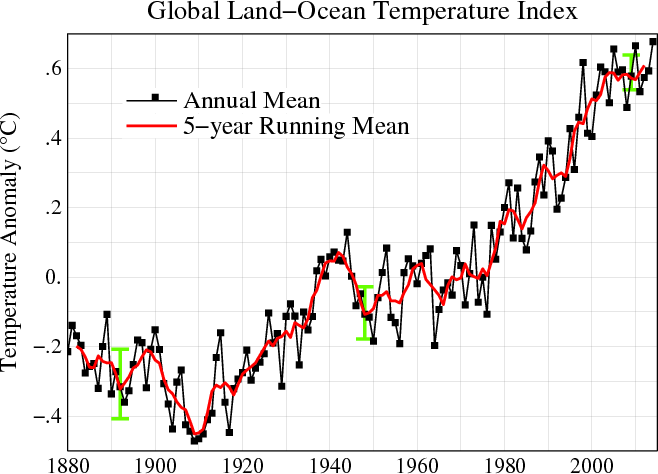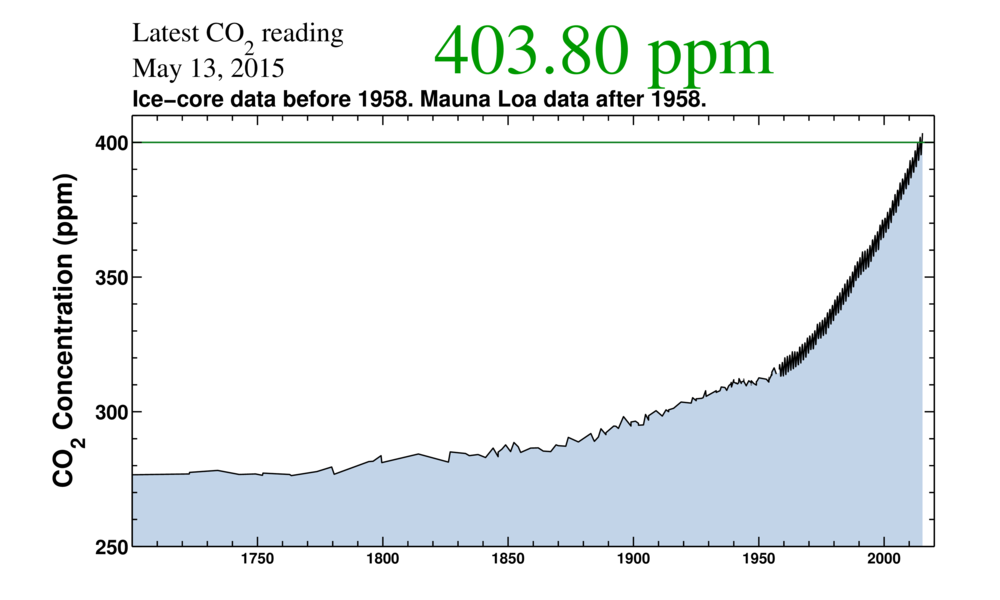Project Goals:
- Behave like a person who is curious about the world!
- Examine piece of climate change in a methodical way
- Become a little more informed about climate change
- Find good sources so your teacher can add them to this website
Basic Background Information
The Industrial Revolution has brought a rise in atmospheric CO2 levels, especially since 1950.
(Graph from Scripps Institution of Oceanography, UC San Diego)
Global average temperatures have risen approximately 0.8 °C in the past 100 years or so.

(Graph from NASA)
Examine these two graphs. What do they mean?
Project Overview
Your assignment is to ask a question about this climate data, then research it using reliable sources. Then your findings will lead to more questions, one of which you will also research.
Work in Partners OR work on your own.
NO groups of 3.
Type your project in Word or Google Docs.
Project is due Thursday, May 21st.
Seniors: turn in Steps 1-3 before May 20th.
Step 1: Ask a Carefully Worded Question
Starting with just the temperature and CO2 data, you can ask a million questions.
•Scientific questions
•Ethical / moral questions
•Sociological / societal questions
I suggest asking a scientific question: a question about the natural world that can be answered with evidence and reasoning. But you can also ask a different type of question as long as you make sure to use scientific knowledge and reasoning to inform your research.
What do these graphs mean? Why do they matter? What information is missing? What needs to be clarified? Be curious!
Clarifying details vs asking about big ideas
Scientific / objective questions
what vs how vs why
Asking about sources, methods, biases of any data/observations
Ethical / opinion / subjective questions
Questions about cause and effect
Questions about the past; questions about the future
If you need help, here is a list of climate change topics you might ask about. Before you click there, think of some of your own ideas!
Step 2: Find Sources
- Find two reliable sources
- Write why you think your sources are reliable.
- Read and learn
- Cite your sources properly (use easybib.com if desired)
Don’t use Wikipedia as one of your sources.
(I like Wikipedia. But for this assignment, look for other sources. Feel free to read Wikipedia to help you understand your topic.)
Be picky. Don’t always select the first sources you find. Glance at a few sites and skim them, and reject them if you don’t like them (not reliable, not the info you want, too hard to understand, etc).
Use good search terms:
•Search for what you think the answers might look like instead of typing a question into the search engine.
•Type in a good list of carefully chosen specific words instead of a sentence.
•When your first (or tenth) search doesn’t work well, add or change some words and try again.
•Don’t forget to look past the first couple of search results.
•For goodness’ sake, do a WEB search, not an IMAGE search!
What types of sources are more likely to be reliable?
•Universities (but not all of them)
•Research institutions (but some are quite biased)
•Government research agencies
•Scientific journals (highly technical reading level)
•Well respected magazines / newspapers (easier to read, but sometimes they get things wrong or have bias)
What types of sources can be unreliable?
- Personal blogs (some are actually quite good, but some are super biased or just super wrong)
- Some newspapers and magazines (bias, wrong info, sensationalism, etc)
- Political / activist organizations (bias)
- Sites paid for by energy industry (bias)
- Ask.com / Yahoo Answers / etc (too many dumb answers)
- Message boards (can contain good info, can also contain a lot of bad info)
Example sources
NASA (National Aeronautics and Space Administration)
EPA (Environmental Protection Agency)
NOAA (National Oceanic and Atmospheric Administration)
IPCC (UN’s Intergovernmental Panel on Climate Change)
Scripps Institution of Oceanography
WHO (World Health Organization)
WWF (World Wildlife Foundation)
Here’s a list of 100 sources (some are pretty biased). FYI, nearly all of the sources in there will recognize climate change as real, important, and something that is impacted significantly by humans. Climate scientists overwhelmingly agree on this basic concept. Don’t worry, though, because it is a very complicated subject, and plenty of things are still legitimately up for debate. It’s a free country, so feel free to look up sites on all sides of an issue.
Look for sources that aren’t too technical for you to understand. Otherwise, you will not be able to summarize what it means in your own words.
Side note: the more you understand about science, the better you can detect poor arguments in your sources.
Step 3: Record what you learn
What answers did you find to your question?
What answers did your sources NOT provide?
No credit if you plagiarize your sources!
Summarize in your own words.
No copying and pasting!
Copying sentences and paraphrasing them is plagiarism (click to read more about this topic)
Step 4: New Question
For practically any really interesting question about climate change, it will be impossible to find a complete answer. What is missing? What do you still want to know? What level of uncertainty exists?
Write a new question.
Example types of follow-up questions
Step 5: Second Round of Research
Find two new sources to help you answer your new question.
Find two new reliable sources
Write why you think they are reliable sources
Read and learn
Cite sources properly
Step 6: What did you learn?
Record what you have learned from your sources, once again avoiding plagiarism.
Step 7: More Questions
Scientists keep asking questions. Each new finding triggers new questions. What are your newest questions?
- Write six new questions based on everything you have read from your sources.
Scientists have a lot of curiosity, and curious people always have more questions.
